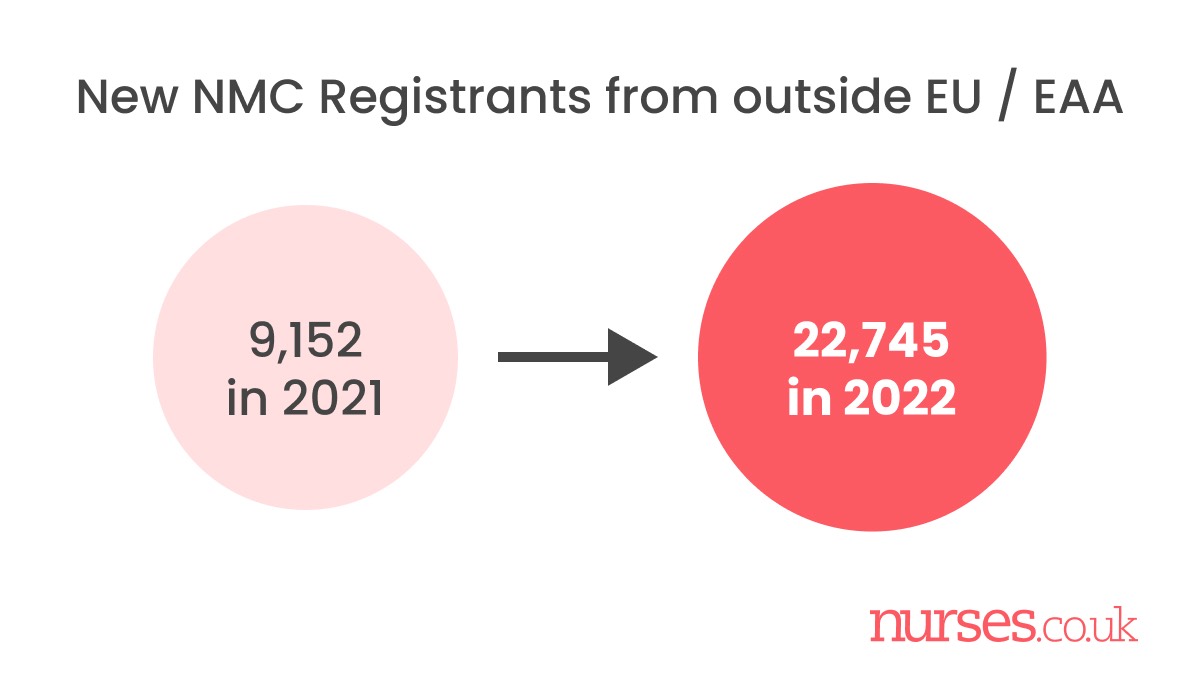- 06 July 2022
- 3 min read
Can Reliance On Overseas Nurses Be Justified When Thousands Are Rejected From UK Nursing Courses?
Subscribe Can stripping other nations of their trained healthcare staff be morally justified with 35,000 potential nursing students denied university places in the UK last year?
Can stripping other nations of their trained healthcare staff be morally justified with 35,000 potential nursing students denied university places in the UK last year?Since 2019, there has been a ten-fold increase in the numbers of Nurses coming to the UK from countries identified as having severe staffing shortages.
To start, it is important to emphasise that this article in no way seeks to diminish or denigrate those Nurses who come from overseas and make such a valuable contribution to our health system here in the UK. The intent of this article is solely to discuss the sustainability and morality of the political choice to rely on recruitment from abroad to sustain the UK nursing workforce.
An analysis of NMC registration data undertaken by the RCN found new entrants to the UK nursing workforce this year included workers from 14 countries out of the 47 on a UK Government ‘red list’. ‘Red list’ countries are deemed to be facing acute shortages in their domestic healthcare workforces. Consequently, UK recruiters are not permitted to actively recruit in those countries unless both governments agree to managed and sustainable recruitment.
Nothing prohibits individuals from those countries from applying directly for UK jobs however, so the red-list recruitment prohibition is not 100% effective.
The 14 countries from the ‘red list’ are: Afghanistan, Bangladesh, Cameroon, Ethiopia, Gambia, Ghana, Lesotho, Malawi, Mauritius, Nepal, Niger, Nigeria, Pakistan, Papua New Guinea, Sierra Leone, Tanzania, and Uganda, according to the RCN report.
The report also shows that the number of recruits from ‘red list’ countries has leapt from 417 in 2019 to 4,272 in 2022. Nigeria accounted for the most joiners in the last year with 3,010 nurses joining the register in the last year, up from 276 in 2019. Ghana was second, with 843 nurses, Nepal accounted for 210 and Pakistan for 112.
Only India and the Philippines, both not on the ‘red list’, accounted for more Nurses joining the NMC Register since 2019.
Do you think that there should be stronger controls on recruiting Nurses from red-list countries to avoid the constant demand from the UK denuding those countries of their own vital and expensively trained healthcare workers?
 22,745 people from outside the EU / EEA joined the register (up from 9,152 the previous year - a 149% increase).).
22,745 people from outside the EU / EEA joined the register (up from 9,152 the previous year - a 149% increase).).A Department of Health and Social Care (DHSC) spokesperson said: "Internationally trained staff have been part of the NHS since its inception in 1948 and continue to play a vital role, while also benefiting enormously from the opportunity to work in the NHS – both in terms of professional development and economically."
"We do not actively recruit from any of these countries, and we have committed £20m towards programmes to strengthen the health workforce in a number of developing countries to support them to train, employ and retain a sufficient and skilled health workforce" they continued.
There is concern about the UK’s growing dependency on recruitment from overseas to try and fill the many nursing posts currently vacant.
International Council of Nurses (ICN) Chief Executive Officer Howard Catton: “ICN is aware that active international recruitment of nurses from low and middle-income countries is increasing, driven by the post-COVID demand for nurses in wealthier countries.”
Almost half of the new nursing staff joining the NMC Register in the year to March 2022 were from overseas. 22,745 people from outside the EU / EEA joined the register (up from 9,152 the previous year).
The total number on the NMC Register who had originally registered outside of the EU / EEA was 113,579 for the year 2021/22. This is up from 92,259 in 2020/21 and constitutes 15% of the total NMC Register.
RCN General Secretary & Chief Executive Pat Cullen said: "Ministers are overly reliant on Nurses from countries with critical workforce shortages. Meanwhile, their lack of investment in UK nursing staff – both today’s and those of the future – is deeply concerning.”
"They can do this by educating more nurses and aiming for self-sufficiency in their domestic supply line, improving the retention of those they already have and by looking at how they can offset and compensate the costs of training nurses, which they are, in effect, currently exporting to less-wealthy countries" she explained.
The RCN stressed that it recognises ‘the contribution made by professionals from around the world to our health and care services and defends the rights of individuals to work in the UK’.
The government’s target of recruiting 50,000 extra nurses by 2024 arguably cannot be met without expanding recruitment from overseas. Do you think it is acceptable and sustainable for the UK to make up shortfalls in the nursing workforce, driven partly by the political choice to limit the number of student nursing places, by recruiting large numbers of qualified staff from overseas?
The RCN has also urged UK governments to expand the domestic workforce, but to do so would require an expansion in the provision of student nursing places at UK universities.
In a House of Lords debate in June this year, former Cabinet minister Lord Peter Lilley described the recruitment of overseas Nurses from poorer countries with their own Nurse shortages as ‘immoral and wrong,’ especially given the thousands of potential nursing students from the UK being turned away.
Lord Lilley said: ‘The alternative surely is to train our own Nurses, more of them. We turned away 26,000 British applicants from nursing courses in (2020), a far higher number than any other training or qualification area.’
"Why are we rationing places in our universities and turning away people who want to be Nurses, who we need as Nurses, blighting their prospective careers and making them do something else instead?" he asked.
There were 73,085 applicants for nursing courses in 2021 according to UCAS. Of these, only 37,805 were offered places, meaning that over 35,000 potential Student Nurses were rejected. In 2020 the total number of prospective Student Nurses rejected was just over 25,000.
UCAS data also shows that nursing courses had an acceptance rate of only 51.7%. This is much lower than the UCAS average of 75% for all other courses.
A UCAS spokesperson said: "Each year, around 20,000 aspiring nurses are unplaced – these students are more likely to be aged 21 and above and at the lower end of the attainment spectrum, demonstrating the competitiveness of the subject. Around 3,000 will reapply."
Should the government be giving serious and immediate consideration to increasing the number of places available on nursing courses in the UK, as the first step in trying to expand the pool of domestically trained Nurses?
According to the Guardian, it costs between £10,000 and £12,000 to recruit an overseas nurse, whereas it takes three years to train a nurse in the UK and costs between £50,000 to £70,000.
Do you think that the perceived short-term financial saving of recruiting a trained Nurse from overseas will continue to be given preference politically over the longer-term and initially more expensive route of training more Nurses domestically?
And if so, should consideration of the cost to the country losing that trained Nurse be factored into the decision as to whether this policy is continued?
Please let us know what you think in the comments, and Like the article if you found it interesting. Thanks.







About this contributor
Nurses.co.uk Founder
I launched Nurses.co.uk (and subsequently Socialcare.co.uk, Healthjobs.co.uk and Healthcarejobs.ie) in 2008. 500 applications are made every day via our jobs boards, helping to connect hiring organisations recruiting for clinical, medical, care and support roles with specialist jobseekers. Our articles, often created by our own audience, shine a light on the career pathways in healthcare, and give a platform to ideas and opinions around their work and jobs.
More by this contributorWant to get involved in the discussion?
Log In Subscribe to commentAdetutu Adewole
Adetutu Adewole
2 years agoI do not think it can be called "stripping" when the nurses are willingly leaving. And I don't think it's ... read more
I do not think it can be called "stripping" when the nurses are willingly leaving. And I don't think it's about morals . I am. Registered Mental Health Nurse in Nigeria and I can say that it's really hard being a nurse in Nigeria. Should we talk about the disrespect, the hate, the severe underpay or long stressful hours with nothing to show for it? There are lots of nurses that are unemployed right now,not because there are no jobs but just because hospitals and organisations prefer to train nurses (quacks) and pay them meagre amounts to do the roles of nurses... That's what we go through here, the country itself doesn't value us. So honestly there's nothing morally degrading about it. If the nurses wanna go where they will be appreciated they should. The country has proven to be fine without them numerous times. They'll continue being fine.
read less
Thanks Adetutu, great to have your perspective so we can see the discussion from all sides. Thank you.
Sue Hester
Sue Hester
2 years agoI didn’t start out wanting to be a nurse. At the time you had to have 5 o levels I ... read more
I didn’t start out wanting to be a nurse. At the time you had to have 5 o levels I only had 2. So I applied to do my orthopaedics at RNOH Stanmore.With excellent references from my grammar school headmaster they allowed me to undertake the course. Not only did I do well in my exams I also was awarded student of the year. On the strength of that I was accepted to do my SRN.Again I excelled,went on to do an occupational health cert then Practice Nurse cert.I was the youngest ever sister where I worked I was responsible for 12000 patients in a gp practice. I undertook any course that was available to me to enhance my knowledge.I loved my job gave 120%.When I turned 40 it became possible to exchange prior learning into modules to gain a degree.However because I only had 2 o levels I was declined.So sadly at the age of 44 I left nursing.What a waste, and it would appear nothings changed. Not everyone who wants to be a nurse wants to take a degree. Why can’t there be Nurse apprentices.With 50000 vacancies I think there needs to be a rethink and a few compromises made. We all learn at different rates and just because you have a degree doesn’t mean you will make a good nurse.Give people a chance .
read less
Thanks Sue. Always sad to hear when a Nurse has to leave the profession when they would choose to stay. It certainly is a shame and, like you, I'm not convinced it is right. Entry requirements for nur... read more
Thanks Sue. Always sad to hear when a Nurse has to leave the profession when they would choose to stay. It certainly is a shame and, like you, I'm not convinced it is right. Entry requirements for nursing degree courses vary because each university sets its own entry criteria. But you are likely to need at least two(usually three)A-levels or equivalent qualifications at Level 3, plus supporting GCSEs including English, Maths and a science(usually biology or human biology). We provide coaching and support to NHS Nurses and HCAs. Nikki, my colleague, RN and Coach, feeds back on this topic. A lot of her HCAs are doing foundation Maths to get Level 2, to then get Level 3. In your career, how important was it for you to be strong on Maths?
read less